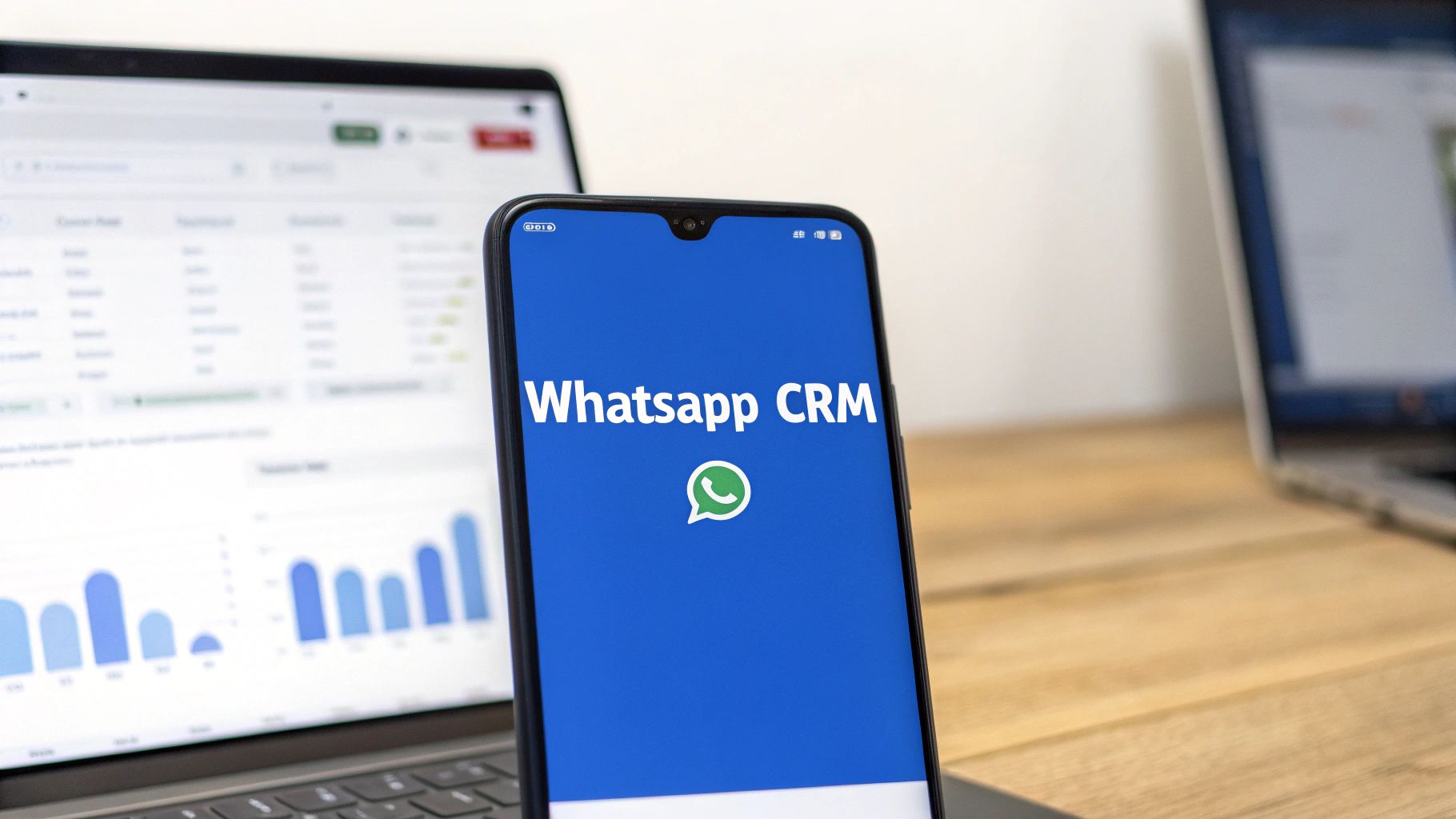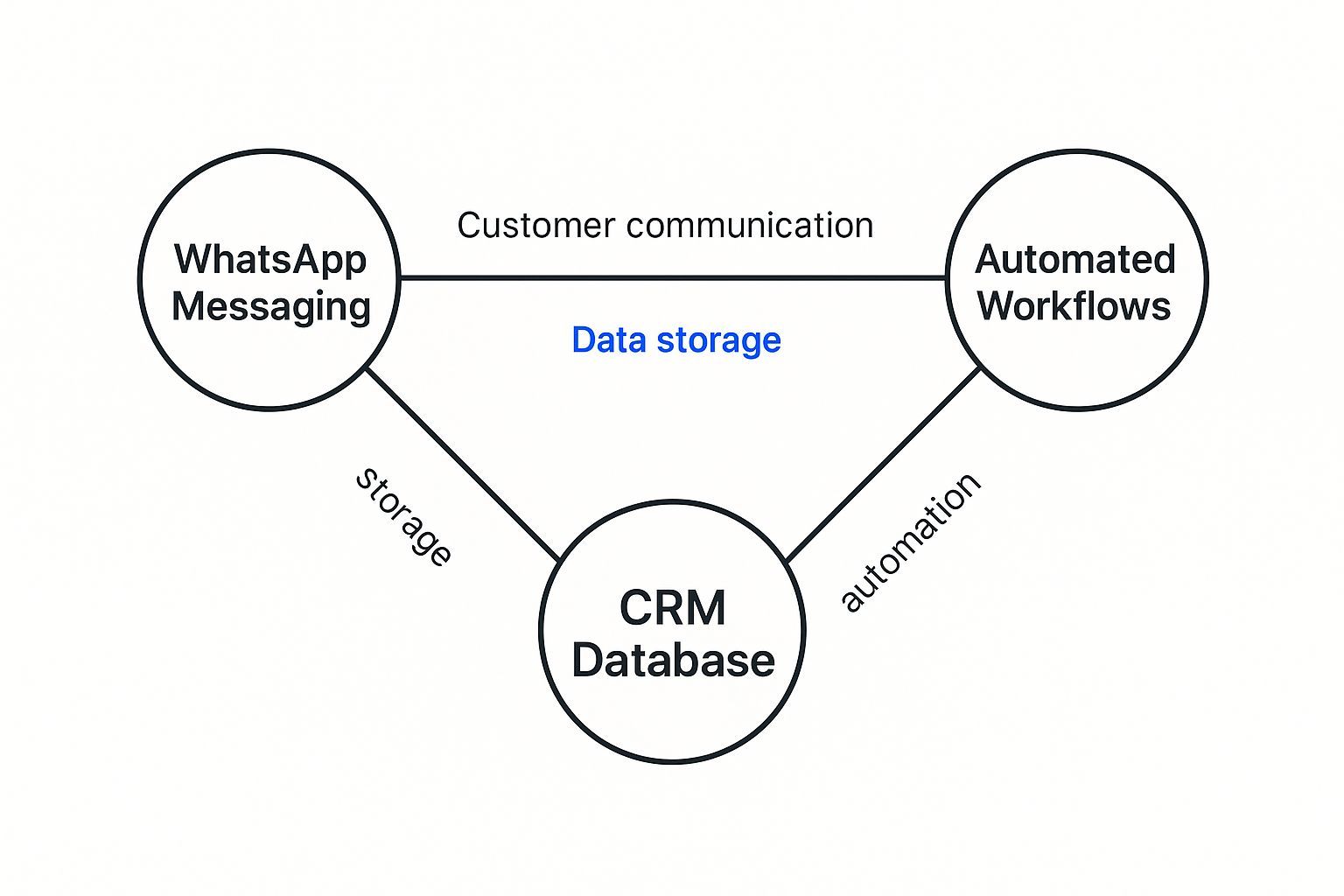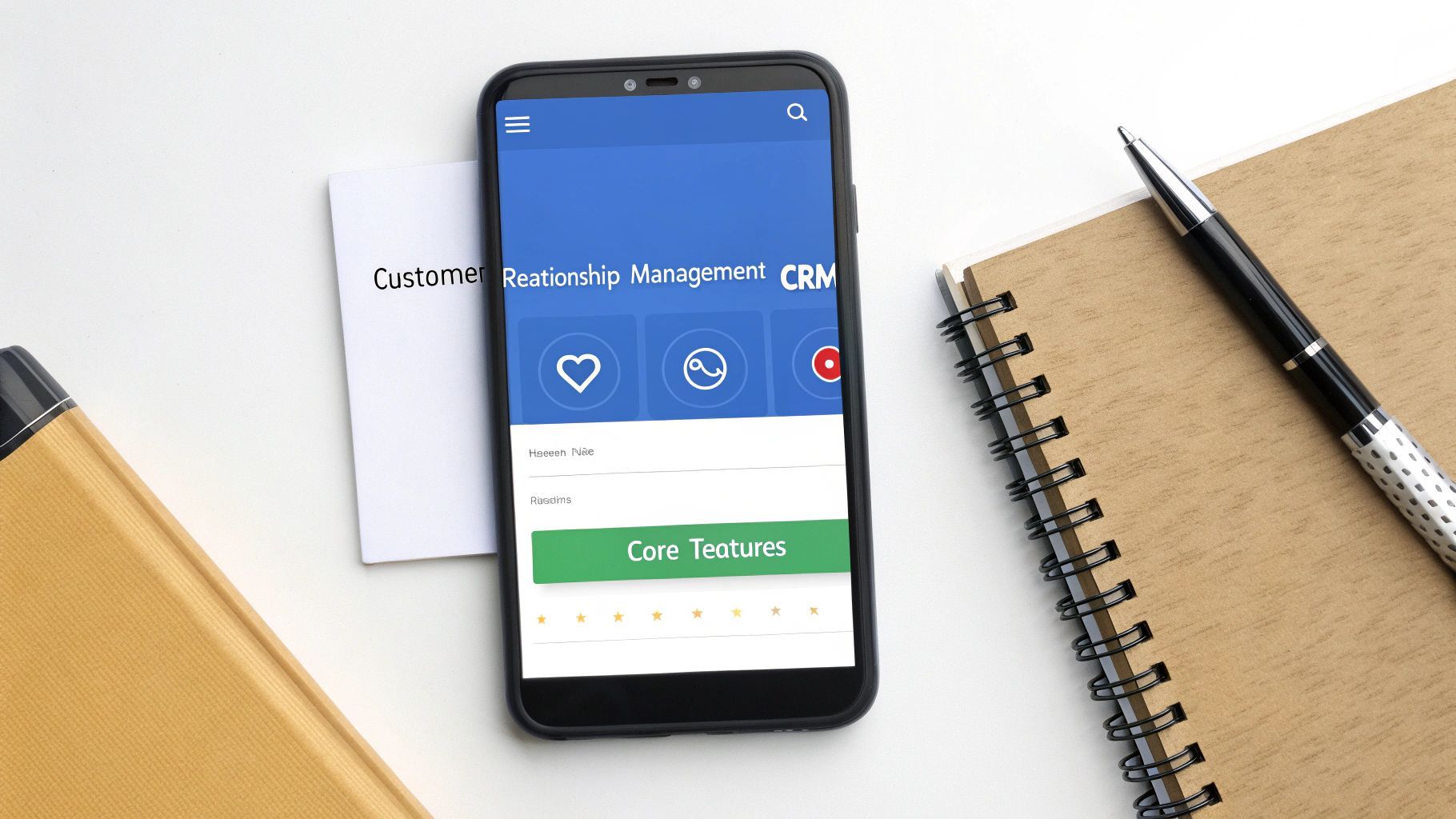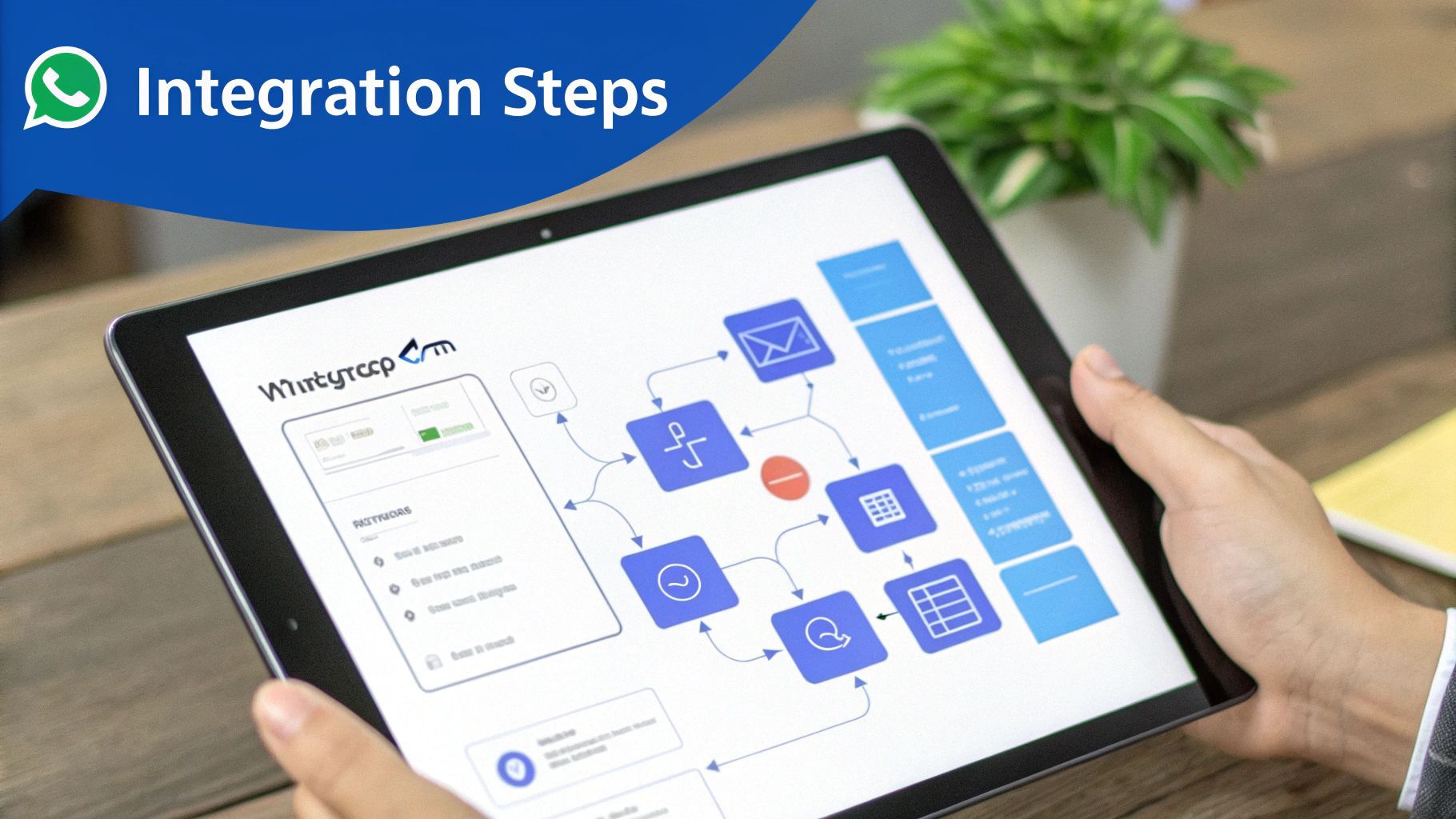
Your Guide to a WhatsApp Integrated CRM
Discuss with AI
Get instant insights and ask questions about this topic with AI assistants.
💡 Pro tip: All options include context about this blog post. Feel free to modify the prompt to ask more specific questions!
At its core, a WhatsApp Integrated CRM is exactly what it sounds like: a system that directly connects your customer relationship management (CRM) software with the WhatsApp Business Platform. This connection turns your static customer database into a dynamic hub for conversation, letting your team manage every customer chat from one central place—right inside your CRM.
Think of a standard CRM as a really well-organized digital filing cabinet. It holds all your vital customer info—names, contact details, purchase history—but it’s passive. To actually talk to someone, your team has to step away from the CRM, find their phone, open WhatsApp, and then, hopefully, remember to log that conversation back in the system later. It’s a clunky, disconnected process that creates gaps and slows everything down.
Now, imagine that filing cabinet could instantly send messages, share order updates, and automatically save every single reply without anyone lifting a finger. That’s what a WhatsApp Integrated CRM does. It builds a bridge between your structured customer data and the fluid, personal nature of a WhatsApp chat. Your CRM and your communication channel stop being two separate tools and start working as one.
This isn't just about bolting on a new feature; it’s a fundamental shift in how businesses interact with customers. People today expect communication to be instant, easy, and personal. They’re not interested in waiting for an email reply or sitting on hold—they want to connect on the apps they already use every day with their friends and family. And with over 2 billion users, WhatsApp is at the top of that list.
This diagram shows how all the pieces fit together to create a powerful, unified system.

As you can see, every direct message on WhatsApp feeds valuable data straight into your CRM. That data then fuels automated workflows, creating a smoother journey for the customer. It's a powerful feedback loop: every conversation enriches your customer profiles, and every enriched profile helps you have smarter, more relevant conversations.
Let's quickly break down the key differences between the old way and the new.
This table provides a quick comparison highlighting the fundamental differences in communication, data management, and customer engagement between a standard CRM and one integrated with WhatsApp.
Feature Traditional CRM WhatsApp Integrated CRM Communication Channel Primarily email, phone calls Direct, real-time messaging on WhatsApp Data Entry Manual logging of interactions Automatic capture of all chat history Customer Experience Formal, often delayed Instant, personal, and conversational Team Workflow Juggling multiple apps All communication inside one unified platform Engagement Rates Lower open and response rates Extremely high (98% open rates)
The contrast is clear. One approach is fragmented and reactive, while the other is cohesive and proactive.
The move toward this kind of integrated communication is undeniable. Message open rates on WhatsApp hit an incredible 98%, a figure that blows email's average of 21% out of the water. It's no surprise that industry forecasts predict 80% of large enterprises will have adopted it by 2025. You can dig into more of these industry benchmarks over at ChatArchitect.com.
An integrated system lets you keep everything—from chat histories to purchase data—all in one place, making every customer interaction seamless and deeply personal.
By connecting with customers on WhatsApp, you’re meeting them on their home turf. This changes customer service from something that just reacts to problems into a proactive opportunity to build real relationships. Suddenly, your business isn't just a faceless company; it's a helpful contact right there in their phone.
Connecting your CRM to WhatsApp isn't just another tech upgrade—it's a complete shift in how you talk to customers and run your business. It brings speed, a personal touch, and serious efficiency into your daily sales and support efforts. This isn't about small tweaks; it's about making real, measurable leaps in growth by turning simple conversations into conversions.
Think about it from a sales rep's perspective. A new lead pops up from a website form. Instead of firing off an email that might get buried in an inbox, they can start a WhatsApp chat right from the CRM. The customer's entire history is right there on the screen—what they've asked about before, which pages they looked at, what they've bought. The conversation isn't cold; it's helpful and relevant from the very first message.

This is exactly what today's customers want. In fact, a whopping 78% of customers are more likely to buy from a brand that gets back to them quickly. A WhatsApp integrated CRM lets you meet that expectation instantly, giving your team a huge advantage. You can dig into more stats on how this works by exploring comprehensive CRM insights.
One of the first things you'll notice is having a single, unified dashboard for every single customer chat. Gone are the days of conversations scattered across different employee phones, which inevitably leads to missed messages and mixed signals. With this setup, every chat is logged and visible right inside the CRM, creating one source of truth for the whole team.
This central hub makes teamwork a breeze. A support agent can hand off a tricky conversation to a sales expert without the customer even realizing it. The new person has the full chat history and can jump in without missing a beat.
This is where a WhatsApp integrated CRM really flexes its muscles. You can build smart automated workflows that send out messages based on what a customer does in your CRM. It’s a massive time-saver and ensures every customer gets a timely, consistent follow-up.
Just imagine these scenarios:
- Abandoned Cart Recovery: A customer leaves items in their cart. An hour later, an automated WhatsApp message pings them with a friendly reminder, maybe even a small discount. Just like that, you're recovering what would have been lost revenue.
- Order Confirmations: The moment an order is marked "shipped," an automatic WhatsApp message with the tracking details goes out. The customer stays in the loop, and your support team gets fewer "Where's my order?" questions.
- Lead Nurturing: A new lead gets automatically enrolled in a drip campaign. Over the next few days, they receive helpful tips and resources via WhatsApp, warming them up perfectly for a sales call.
When you combine WhatsApp's direct line to customers with all the rich data in your CRM, you can finally say goodbye to generic marketing blasts. Segmentation becomes your superpower. You can send targeted promotions to customers based on their buying habits, location, or how they've interacted with you before. A WhatsApp integrated CRM makes every customer feel like they’re having a one-on-one conversation with your brand.
The real power here is turning your CRM from a static database into an active, revenue-generating machine. It puts your team right where your customers are, armed with the context to build trust and close deals faster.
To get into the nitty-gritty of connecting these systems, check out our guide on CRM WhatsApp integration for more practical steps.
A top-notch WhatsApp-integrated CRM is so much more than a chat window tacked onto your database. It's a powerhouse of tools built to help your team work smarter, not harder. To really get what makes these systems tick, you need to look past the marketing jargon and see how the core features actually change the game for your day-to-day operations.
Let's dive into the non-negotiables.
Think of the classic problem: a customer sends a WhatsApp message, and it lands on one employee's phone. That employee is busy, out sick, or goes on vacation. What happens? Silence. The customer gets frustrated, and you might lose a sale. It’s chaos.
A shared team inbox solves this completely. It’s like a central command center for all your WhatsApp conversations. Every message from every customer flows into one unified, collaborative space. Your whole team can see who’s talking to whom, review past conversations, and seamlessly hand off chats between sales and support. No more crossed wires or duplicate replies—just one consistent, professional experience for your customers.

You can't just message customers out of the blue on WhatsApp—they have to opt-in first. This is where automated message templates come in. These are pre-approved, structured messages you can send to kick off a conversation or provide an important update.
Instead of your team spending hours manually typing out the same messages over and over, you can set up triggers directly from your CRM. It's a massive time-saver and a huge win for customer experience.
Imagine being able to automatically send:
- Order Confirmations: A message with order details hits their WhatsApp the second they click "buy."
- Shipping Updates: A notification with a tracking number goes out the moment a label is created.
- Appointment Reminders: A quick, friendly reminder lands on their phone 24 hours before a meeting, drastically cutting down on no-shows.
What happens when a lead messages you at 10 PM? With an AI-powered chatbot, they get an instant, helpful reply. These bots are your 24/7 frontline support, handling common questions, gathering lead info, and routing complex issues to the right person for follow-up during business hours.
This isn't about replacing your team; it's about freeing them up. By letting a bot handle the repetitive, easy-to-answer queries, your people can focus their energy on the high-value conversations that actually close deals and solve tricky problems. A good chatbot ensures no customer is ever left waiting.
When you put all these features together, you can see that a WhatsApp CRM doesn’t just store conversations—it makes them better. It ensures every single interaction is tracked, informed by customer history, and handled by the right person at the perfect time.
Finally, a couple of foundational features hold everything together: seamless contact syncing and conversation analytics.
Contact syncing is simple but crucial. When a message comes in from a new number, the system automatically checks your CRM. If the contact exists, the chat is instantly linked to their profile. If not, a new contact is created. This keeps your data clean and gives your team immediate context on who they’re talking to.
Analytics, on the other hand, is your window into performance. You can track key metrics like:
- Average response times
- Peak conversation hours
- Conversation resolution rates
- The most frequently asked questions
This isn't just data for data's sake. It's actionable intelligence that helps you refine your sales process, improve your support scripts, and make smarter business decisions. For any company serious about building a modern omnichannel retail strategy, this level of insight is indispensable.
To give you a clearer picture, let's break down these essential features and what they truly deliver for a business.
Feature Description Primary Business Impact Shared Team Inbox A centralized hub where all team members can view, manage, and respond to WhatsApp conversations. Eliminates missed messages, improves team collaboration, and ensures consistent customer communication. Automated Templates Pre-approved messages that can be triggered automatically for proactive updates like order confirmations or reminders. Saves countless hours of manual work, reduces no-shows, and enhances the post-purchase customer experience. AI-Powered Chatbots Automated bots that provide instant responses to common queries, qualify leads, and route conversations 24/7. Boosts lead capture, improves response times, and frees up human agents to focus on high-value interactions. Contact Syncing Automatically matches incoming WhatsApp numbers with existing CRM contacts or creates new records. Provides immediate context for every conversation, maintains a clean database, and personalizes interactions. Conversation Analytics Dashboards and reports that track key metrics like response times, volume, and resolution rates. Delivers actionable insights to optimize team performance, identify trends, and improve overall customer service.
Choosing a solution with this core set of features ensures you're not just adding another channel—you're building a more efficient, responsive, and data-driven organization.
Theory is one thing, but the real magic of a WhatsApp-integrated CRM happens when you see it solving actual problems for businesses just like yours. This isn't just a fancy tech upgrade; it’s a practical tool that delivers real, measurable results in all sorts of industries. When companies start meeting customers on their favorite app, they change how they do business—one conversation at a time.
Let's look at how three very different sectors are turning simple WhatsApp chats into serious business growth.
If you run an online store, you know the pain of the abandoned cart. It's a constant headache. One major e-commerce brand was watching nearly 70% of their shopping carts get left behind. Their email reminders were just getting buried, and that meant a huge amount of money was walking out the door.
So, they plugged WhatsApp into their CRM and set up a simple automated workflow. Now, an hour after a cart is abandoned, the customer gets a friendly, low-pressure message on WhatsApp. It’s not pushy—just a helpful reminder with a link straight back to their cart, and maybe a small discount to sweeten the deal.
The impact was immediate. The brand saw a 22% recovery rate on those abandoned carts, with the sales coming directly from the WhatsApp nudges. That simple change turned a massive leak in their sales funnel into a reliable source of revenue. You can find more ideas for integrating WhatsApp with CRM in our detailed guide.
The property market can be painfully slow. It’s an industry built on missed calls, voicemails, and emails that get answered days later. A boutique real estate agency was tired of this drag and wanted to give their clients a faster, more modern experience. Their agents were spending way too much time just trying to schedule viewings and chase down paperwork.
Their solution? A WhatsApp-integrated CRM. Agents started using WhatsApp to schedule viewings instantly and send automated reminders the day before. They also used it to share secure links for document uploads and get quick replies on anything outstanding.
This simple move took critical conversations out of the slow lane and put them on the fast track with WhatsApp. As a result, the agency cut its average property closing time by a full 15%. Agents were suddenly free from admin headaches and could focus on what they do best: building relationships and closing deals.
A busy healthcare clinic was fighting a constant battle with no-shows. Staff spent hours on the phone making reminder calls, but patients would still forget appointments they'd booked weeks ago. They desperately needed a more reliable way to connect.
By linking WhatsApp to their CRM, they automated the whole patient journey. People could now book appointments through a chatbot, get instant confirmations, and receive timely reminders. After their visit, a secure follow-up message would check on their recovery and ask for feedback.
This new system completely changed the patient experience for the better. The clinic cut its no-show rate by over 30% and saw a huge jump in positive reviews. By simply being present on the app their patients were already using, the clinic built a more efficient practice and much stronger patient relationships.
Picking the right software for your company can feel like a huge decision, but it doesn’t have to be. Choosing the perfect WhatsApp-integrated CRM isn't about finding the tool with the longest feature list; it's about finding the one that fits your specific business needs like a glove. If you take a methodical approach and ask the right questions, you'll land on a solution that solves today's problems and scales with you tomorrow.
Think of it like building a checklist. Before you even look at a demo, you need to be clear on a few critical points. The best place to start is by figuring out how any new platform will slot into your current day-to-day operations.

First things first, take a hard look at your existing tech stack. The best WhatsApp-integrated CRM is one that plays nicely with the tools you already use every day. You need to ask potential vendors about their native integrations—can they connect seamlessly with your e-commerce platform, your email marketing software, or your main CRM? A clunky, custom-coded setup is just a maintenance headache waiting to happen.
Then, think about where your team is headed. A solution that’s perfect for a team of three might crumble under the pressure of thirty. Scalability isn't just a buzzword; it’s a critical piece of the puzzle for any growing business.
The right platform should feel like a long-term partner, not just a temporary fix. It must be able to handle an increasing volume of conversations and users without a drop in performance or a massive spike in cost.
Here are the key questions you should be asking to guide your evaluation:
- Integration: Does it offer simple, no-code connections to my most important tools (like Shopify or Salesforce)?
- Scalability: Can this system actually grow with my business? What are the hard limits on users and conversations?
- Automation: How smart are its automation and AI features? Can it genuinely handle routine customer questions without human help?
- Security: Is the platform GDPR-compliant and an official Meta Business Partner? How, exactly, is my customer data being protected?
- Pricing: Is the pricing model straightforward and transparent? Can I easily predict my costs as my usage goes up?
When it comes to customer data, security is completely non-negotiable. While WhatsApp messages themselves are end-to-end encrypted, you have to be sure your CRM provider also meets the highest security standards.
The financial upside is just as important. For instance, businesses that tap into the WhatsApp Business API can slash their customer service costs by up to 30% by automating common inquiries. This kind of efficiency is a game-changer, especially in fields like e-commerce and logistics where you're juggling a massive volume of customer chats.
Getting clear answers to these questions gives you a solid framework for comparing your options. This deliberate approach helps you see past the flashy marketing and focus on the practical, nitty-gritty functionality that will actually empower your team and improve your customer relationships.
For more ideas on building customer loyalty, take a look at our guide on retention marketing with WhatsApp.
You've seen what a WhatsApp CRM can do, but you probably still have a few practical questions. Let's tackle some of the most common ones that come up when businesses start exploring this.
This is a really important one to get right. Think of the standard WhatsApp Business App as the solo musician's toolkit. It's a fantastic, free app designed for a single user—perfect for a small business owner managing chats from one phone. It gives you a business profile and some handy tools like quick replies.
A WhatsApp integrated CRM, on the other hand, is the full orchestra. It’s built for teams and growing businesses. It connects to the official WhatsApp Business API, plugging the world's most popular messaging app directly into your central customer database.
That connection is what unlocks the serious power the basic app just can't match:
- Shared Team Inbox: Multiple people can jump in and manage conversations without tripping over each other.
- Automation: Automatically send messages based on things happening in your CRM, like a customer placing a new order.
- AI Chatbots: Offer instant, 24/7 support or help qualify new leads before a human ever steps in.
- Real Analytics: Get deep insights into how your team is performing and what conversations are actually working.
In short, the free app is for one-person shows. The API integration is for teams that need to manage customer communication professionally and at scale.
Yes, absolutely. WhatsApp is very serious about protecting its users from spam, so they have strict rules to make sure every conversation is valuable and wanted.
The biggest rule is the 24-hour session window. When a customer messages you first, a 24-hour clock starts. During that window, you can reply with any kind of message you want. But once that window closes, you can't just send them a casual message anymore.
So how do you reach out after 24 hours, or start a new conversation? You have to use Template Messages. These are pre-approved, structured messages for things like shipping updates, appointment reminders, or payment alerts—not for straight-up marketing. And the most crucial part: customers must have clearly opted-in to receive these messages from you beforehand.
The honest answer? It really depends on the tools you're using. The great news is that most modern providers have worked hard to make this process as painless as possible.
For widely-used CRMs like HubSpot, Salesforce, or Zoho, many solutions offer simple, no-code integrations. We're talking a few clicks—just authorize access, follow a quick on-screen guide, and you're connected.
If you have a custom-built CRM or a less common one, you might need a developer's help to get everything hooked up through the API. Before you sign up for any service, always check out their integration guides and see what kind of support they provide. You want a solution that matches your team's technical skills and won't cause headaches down the road.
Ready to see how an AI-powered WhatsApp integrated CRM can change how you talk to customers? Spur offers a no-code setup that connects seamlessly with your favorite tools, helping you automate support, capture more leads, and drive sales 24/7. Start your free trial today and launch in minutes.
